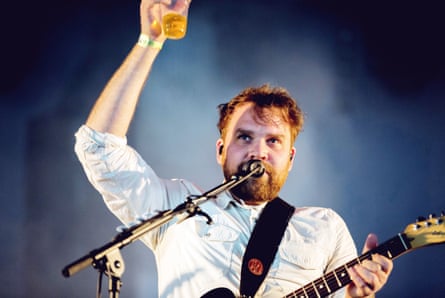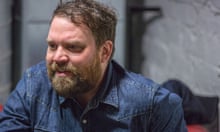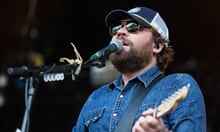Scott Hutchison was incredibly shy as a child, so much so that his mum called him a frightened rabbit. It’s a poetically neat phrase on its own, vivid and unmistakably sad – but given Hutchison’s use of it as a band name, it becomes instilled with power and pride. Hutchison’s adoption of the name is an avowal of his timidity, and an affirmation that insecurity and pensiveness don’t need to be character flaws. For insecure and pensive teenagers this was a reassuring idea, and in some ways entirely novel.
At first a solo project, Frightened Rabbit formed in 2003 in Selkirk, near the England-Scotland border, but have been based in Glasgow since 2004. After Hutchison’s brother Grant joined, the pair released their debut album, Sing the Greys, in 2006 via the indie label Hits the Fan, before adding guitarist Billy Kennedy and signing to Brighton’s Fat Cat Records. Their second album, The Midnight Organ Fight, came out in 2008 and was a critical hit not just in the UK but in the US, where Pitchfork scored the album an 8.1, and AV Club an A-. In the decade since, the band expanded to five members and released three more studio albums, while Hutchison released a solo album under the name Owl John in 2014 and formed indie supergroup Mastersystem with the Editors’ guitarist Justin Lockey.
Ostensibly, Frightened Rabbit are folk-slanted indie rock, with a fairly conventional band setup of guitars, bass and drums, but Hutchison’s songwriting more closely parallels pop-punk as well as country. Their songs oscillate between chorus-centric anthems such as The Modern Leper and Holy, stripped back slow songs such as Poke, or chant-along ballads in the form of State Hospital and Keep Yourself Warm. Hutchison had a shrewd understanding of song structure and melody, but it’s his lyricism that is so enthralling.

At a time when British guitar music was typified by a singular and exclusionary caricature of manhood, from the blokey likes of Kaiser Chiefs, Hard-Fi and Kasabian, The Midnight Organ Fight depicted a masculinity that was self-consciously flawed. Here was a voice clumsily yearning for romance and happiness, genuine and self-deprecating but embarrassed, clueless and occasionally cowardly. The Twist captures the excruciating gaucherie and uncertainty of dancing with a stranger you’re interested in; Fast Blood viscerally describes sex with stream-of-consciousness immediacy; while Keep Yourself Warm reneges on the performative lothario Hutchison evokes earlier on the album, finding the intimacy of relationships infinitesimally superior to “getting your hole”, that brilliantly hideous Scottish synonym for casual sex. A classic heartbreak record, Midnight didn’t navigate the travails of young love and lust so much as trip over them and mutter an unnecessary apology.
This was a relatable vulnerability for the awkward masses disenfranchised by the stubborn confidence of rock music. In vacillating between contrived irony and frank earnestness, Hutchison was a spokesperson for the twenty- and thirtysomethings who mostly make up Frightened Rabbit’s fanbase. This was an identity we could map ourselves on to, and then feel empowered by the communality.
This mirroring was sustained in subsequent albums, and that old cliche of the audience growing, ageing and changing in time with the artist held true. Although Hutchison wrote about specific politics and relationships – he was, for instance, a vocal supporter of Scottish independence ahead of the 2014 referendum – he unfailingly and surgically captured quirks of thought, character and situation shared by his listeners.
The urgency to escape the relentlessness of everyday life is articulated by Swim Until You Can’t See Land’s couplet: “If I hadn’t come now to the coast to disappear / I may have died in a landslide of rocks and hopes and fears”, while The Wrestle comically but incisively captures the suppressed anxiety of having sex with someone for the first time: “Bare those teeth to me please, man-eater / You can see all of me, naked with fear.” Hutchison’s music touched his fans because he was fundamentally kind and honest, because he humbly extended a hand of solidarity with a wry smile and an open heart.
Hutchison’s struggles with depression were something he also habitually visited in song. Frightened Rabbit’s most recent album, 2016’s Painting of a Panic Attack, was especially intense, with songs such as Woke Up Hurting and 400 Bones conveying a fragile frame of mind. It’s common practice to wax lyrical about music confronting depression, to praise an artist’s candour around their mental illness, and to project a myth that the process of writing, recording and releasing these songs must be purgative for the artist, because it is therapeutic for the listener. The truth, of course, is more upsettingly complicated.
Last month was the 10-year anniversary of The Midnight Organ Fight, and the band celebrated by touring the album in full to sold-out venues across the UK. Midnight’s closing song, Floating in the Forth, details Hutchison visualising taking his own life, before he triumphantly sings: “I think I’ll save suicide for another year.” At every live show, particularly during this last run of shows, this was a line unanimously and cathartically screamed back at him, signalling how supportive the lyric, song, album and man have been to so many. Given the aligning of circumstances, it’s tempting to desperately scramble for meaning or prescience in this, to derive some significance and symbolism from what has happened. But there is no tragic poetry in this death, only tragedy – and the loss of a wonderful songwriter and a better person.
- In the UK, the Samaritans can be contacted on 116 123. In the US, the National Suicide Prevention Hotline is 1-800-273-8255. In Australia, the crisis support service Lifeline is on 13 11 14. Hotlines in other countries can be found here.


